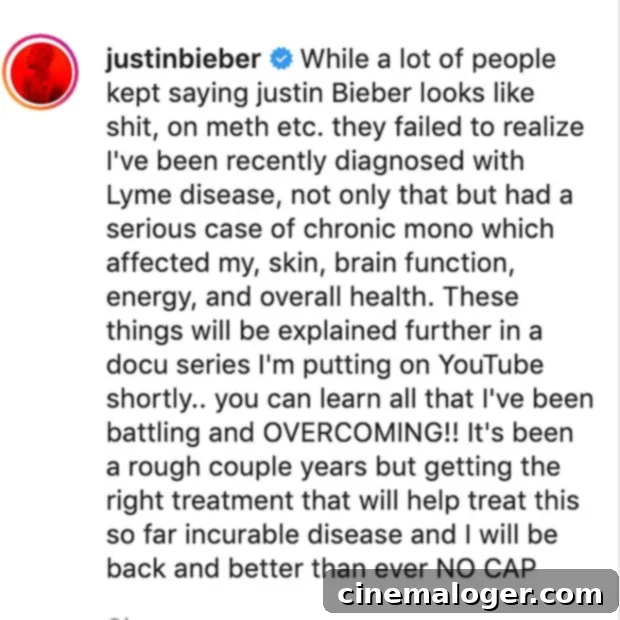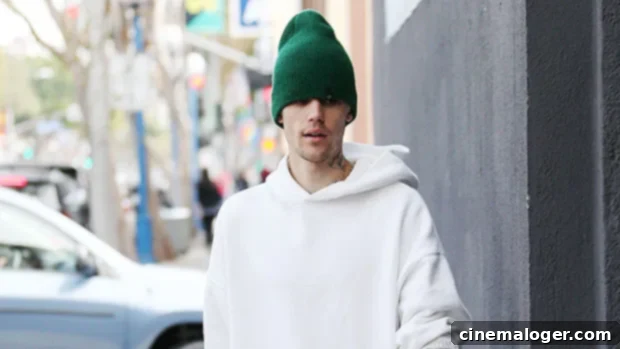Justin Bieber’s Health Journey: Unmasking Lyme Disease and Chronic Mono Amidst Public Scrutiny
For years, global superstar Justin Bieber has been a focal point of intense public scrutiny, with every aspect of his life, from his appearance to his relationships, meticulously dissected. This relentless attention often led to baseless speculation, particularly concerning his health. The most damaging of these rumors suggested drug abuse, specifically “meth” use, due to perceived changes in his physical appearance. However, on January 8, the singer took to Instagram to unequivocally address these damaging claims, revealing a truth far more complex and challenging than any tabloid could invent: he was battling serious, non-drug-related health issues, including Lyme disease and chronic mononucleosis.
The persistent whispers and outright accusations about his well-being finally prompted Justin Bieber to set the record straight. Sick of fans and detractors alike “picking apart his appearance and spreading rumors about ‘meth’ use,” the then 25-year-old artist used his platform to share a screenshot of a headline referencing his Lyme disease diagnosis. His accompanying message was raw and revealing: “While a lot of people kept saying justin Bieber looks like s—t, on meth etc. they failed to realize I’ve been recently diagnosed with Lyme disease.” This powerful statement served not only as a denial of the drug rumors but also as a crucial first step in educating his millions of followers about the invisible battles he was fighting. He didn’t stop there, further disclosing, “not only that but had a serious case of chronic mono which affected my, skin, brain function, energy, and overall health.” This revelation painted a clearer, more empathetic picture of the struggles that had visibly impacted him, explaining the very changes in his demeanor and physical state that had fueled so much misinformed public discourse.
Justin’s decision to share his private health struggles publicly was a significant moment, offering a glimpse into the immense pressure faced by celebrities. He acknowledged that these profound health challenges would be explored in greater detail. “These things will be explained further in a docu series I’m putting on YouTube shortly,” he announced, indicating a commitment to transparency and a desire to inform and educate. This forthcoming series promises to offer fans and the wider public a deeper understanding of “all that I’ve been battling and OVERCOMING!!” The singer admitted to having a “rough couple years,” a period that undoubtedly encompassed not only these recent health diagnoses but also past struggles with mental health and the pressures of early fame. Despite the severity of his conditions, Justin conveyed a message of hope and resilience, revealing that he was “getting the right treatment” to “help treat this so far incurable disease.” He concluded his heartfelt post on an undeniably optimistic note, declaring with characteristic Bieber confidence, “I will be back and better than ever NO CAP.” His candor didn’t end with the Instagram post. Still feeling the emotional weight of public judgment, Justin later used Twitter to address the negativity directly: “I see a lot of people on here just creating lies and saying that they hope I lose in everything I do. Well I hope you all win. I hope everything you want in life happens for you. Regardless of how you feel about me I send back love.” This mature and gracious response highlighted his personal growth and refusal to sink to the level of his detractors, opting instead to spread positivity amidst adversity.
Concerns about Justin’s health weren’t entirely unfounded prior to his public announcement, though the public’s interpretation was gravely misguided. His physical appearance had indeed sparked worry among fans and media alike. In September 2019, he was spotted on multiple occasions with an IV drip extending from his bandaged arm, a sight that naturally fueled speculation. While an IV drip can be administered for a variety of reasons, from hydration to vitamin infusions, the public’s immediate leap to conclusions about substance abuse underscored the harsh reality of celebrity life, where even routine medical care can be sensationalized. In a second instance that month, Justin was seen leaving a doctor’s office in Beverly Hills, although he notably appeared to be in good spirits, casually rocking Crocs for his visit. These public sightings, devoid of context, unfortunately contributed to the very rumors he later sought to dispel, highlighting the relentless nature of media and fan observation.

Justin Bieber’s Twitter Post on Jan 8th, 2020
By openly discussing his battle with Lyme disease, Justin Bieber joined a growing list of prominent figures, including model Bella Hadid and his ex-girlfriend Selena Gomez, who have courageously shared their experiences with this debilitating illness. According to the Centers for Disease Control and Prevention (CDC), Lyme disease is a bacterial infection “transmitted to humans through the bite of infected blacklegged ticks.” The initial symptoms can be deceptively flu-like, including “headache” and “fatigue,” often accompanied by a distinctive ‘bull’s-eye’ rash. However, if left undiagnosed and “untreated, infection can spread to joints, the heart, and the nervous system,” potentially leading to severe and chronic health complications such as arthritis, facial palsy, heart palpitations, and nerve pain. While early-stage Lyme disease is typically cured with a course of antibiotics, a significant challenge arises for many patients in the form of post-treatment Lyme disease syndrome (PTLDS), where symptoms like pain, fatigue, and cognitive difficulties can “linger” for months or even years after treatment. A sobering 2019 Newsweek article, citing a study published in BMC Public Health, reported that scientists predicted this persistent form of Lyme disease could affect nearly two million Americans by 2020, highlighting the widespread impact and ongoing medical mystery surrounding chronic Lyme. Justin’s simultaneous diagnosis of chronic mononucleosis, commonly known as mono or the “kissing disease,” added another layer of complexity to his health ordeal. Mono is a viral infection, often spread through saliva, caused by the Epstein-Barr virus. While acute mono typically resolves within a few weeks, the “chronic” aspect of Justin’s case implies a prolonged period of severe fatigue, swollen lymph nodes, sore throat, and headaches, further contributing to his overall debilitation and visible changes. Unlike bacterial infections like Lyme, mono does not respond to antibiotics, requiring rest and symptomatic relief for recovery, making the management of both conditions simultaneously a formidable challenge.
Justin’s recent health revelations also provided crucial context for a candid Instagram post he shared in September 2019, where he reflected on his past struggles. In that vulnerable message, he admitted to “doing pretty heavy drugs at 19,” although he didn’t delve into specifics. This admission was part of a broader discussion about his battles with depression and the profoundly “damaging effects of being exposed to fame so young.” Having launched his music career at just 13 years old, Justin experienced an adolescence unlike any other, catapulted into the global spotlight without the chance for normal development or privacy. This early exposure to immense pressure, constant scrutiny, and the pitfalls of celebrity culture undoubtedly contributed to a period of turmoil and unhealthy coping mechanisms. However, the singer emphasized that he was now in a dramatically different and much healthier phase of his life. He wrote about the arduous journey of recovery: “It’s taken me years to bounce back from all these terrible decisions, fix broken relationships, and change relationship habits.” This profound period of self-reflection and personal growth underscored his resilience. Justin credited his support system, stating, “Luckily, God blessed me with extraordinary people who love me for me.” Central to this newfound stability and happiness was his marriage to Hailey Baldwin, then 22. “Now, I am navigating the best season of my life — ‘MARRIAGE’!!” he proudly declared, highlighting the profound positive impact his wife had on his mental and emotional well-being, providing a solid foundation amidst the ongoing challenges of his health.
As proof of his newfound clarity, resilience, and renewed focus, Justin Bieber marked his return to the music scene with significant momentum. On January 3, he released his highly anticipated single, “Yummy,” a track that immediately garnered widespread attention. This single served as the precursor to his first studio album in over four years, a record that was set to arrive later in 2020, reigniting excitement among his global fanbase. The upcoming album was more than just new music; it represented a triumphant return to his artistic passion, a testament to his personal journey of overcoming adversity, battling chronic illnesses, and finding stability in his personal life. Beyond the album, 2020 also promised his much-anticipated return to touring, scheduled to commence in May. Embarking on a global tour while managing chronic conditions like Lyme disease and chronic mono is an immense undertaking, further underscoring his determination and commitment to his career and his fans. This period marked a powerful resurgence for Justin Bieber, not just as a musician, but as an individual who has openly navigated significant personal and health battles, inspiring millions with his transparency and unwavering spirit. His story continues to be one of enduring fame, profound personal growth, and a resolute return to the spotlight, now armed with a deeper understanding of himself and a commitment to authenticity.
